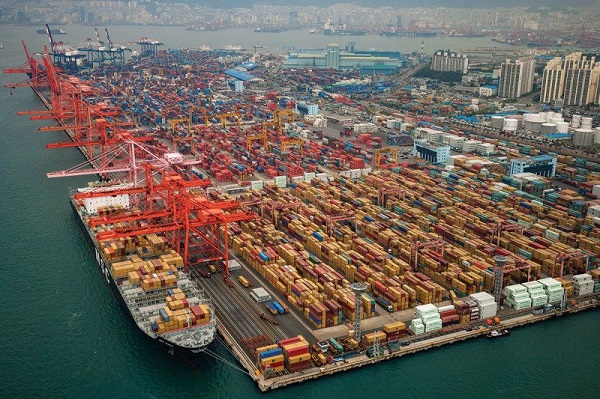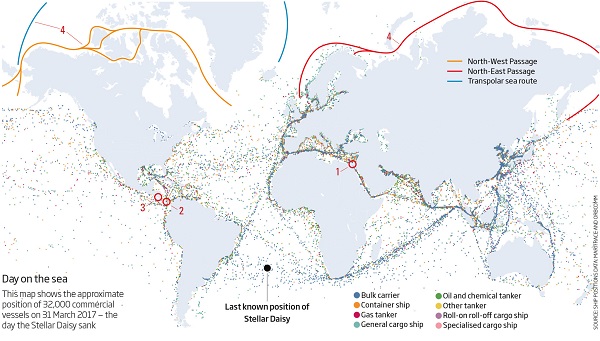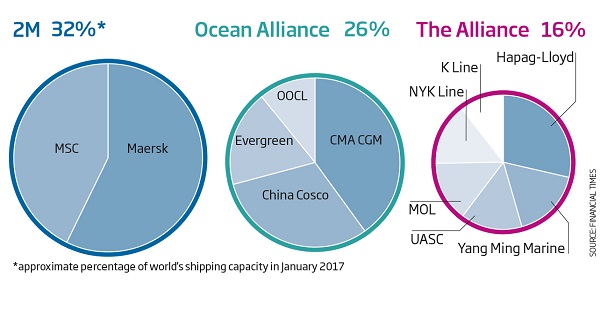
Did you know that an average of 119 ships have been lost on the high seas each year, according to insurance firm Allianz?
In the last decade around 100 large ore-carrying ships have sunk (98 between 2007 and 2017 to be exact) including four in one 36-day period leading up to Christmas 2010. Many of these sank in calm seas, so what is going on?
The New Scientist took a look at the world shipping industry and came up with some answers.
The example used in the article was the sinking of the Stellar Daisy on 31 March 2017, which sank in the South Atlantic Ocean carrying 260,000 tonnes of iron ore from Brazil to China. The ship sank very quickly. One of the two survivors said that the captain had called all the crew to the bridge. Before he got there he found himself underwater “rolling like I was in a washing machine”.
The Stellar Daisy was flagged in the Republic of the Marshall Islands, where the authorities are still conducting an investigation. However, we do know that the ship was a converted oil tanker, converted in 2007 as a 14-year-old vessel, a practice which started around 2000. According to maritime intelligence service VesselsValue 49 of the 162 known ‘very large ore carriers’ (VLOCs) plying the oceans are converted tankers.
Given that one survivor reported a loud bang before the Stellar Daisy sank, the most likely explanation is structural failure.
The article says that conversion:
- entailed an engineering overhaul that changed the ship’s structure. Liquid oil can be pumped into tankers through narrow inlets, but loading ore requires large hatches to be cut into the deck. Plus, the main supporting steelwork in tankers runs front to back, but in ore carriers it must run side to side. The conversion of the Stellar Daisy therefore involved a lot of new welding.
Then:
- About a week after the ship sank, a 15-centimetre crack was found in the hull of another vessel owned by Polaris, the Stellar Unicorn. Shortly afterwards, it was decommissioned. Then the master of the Stellar Queen, another Polaris vessel, found cracking on its deck and had to stop for repairs. Both ships were ore carriers that had been converted from tankers.
Two months before it sank the Stellar Daisy was inspected by the port authority in Tianjin, China, where two problems with watertight doors were identified, but no faults with the hull.
Another issue known to have caused problems is ‘liquefaction’, an issue with bauxite and iron ore. Moisture content in the ore separates and becomes mobile through the vibrations caused by buffetting waves, which can then slosh from one side of the hull to the other. A large wave can then capsize the ship. This is thought to have happened with the Bulk Jupiter, which sank on 2 January 2015, 300 kilometres south-west of Vietnam, carrying 46.000 tonnes of bauxite.
Apparently the ore as delivered to the dock had less than 10% moisture, as required, but was then subject to 370mm of rain during the six days before departure, lifting the water content to 21%.
Apart from the above there are the more obvious problems of huge storms, mutinies, pirates and collisions which can endanger the approximately 51,000 commercial ships, leaving aside passenger ships and tugboats.

Registering ships in Panama, the Marshall Islands, the Bahamas and the like allows shipping companies essentially to decide themselves on quality standards, inspection regimes and worker conditions, scope for another post. The industry has a fatality rate 20 times that of the average British worker.
In recent years supply has exceeded demand, which increases competition and places pressure on standards. The industry has responded by forming three alliances to reduce competition.

On the positive side it reduces the incidence of ships travelling empty or with spare capacity.
Some 80% of traded goods are carried by sea. CO2 emitted by ships is minimal at 3g per tonne per kilometre, compared to 560g for air, 47g for road and 18g for rail.
The world map above shows the choke points in international shipping. Only 15 ships per day go through the Suez canal. In 2015 Egypt launched a project to double the channel in one section which should roughly double the number traversing the channel. The Panama canal may be supplemented by the Nicaragua canal, three times the length, but would take the largest ships which the Panama locks can’t handle. However, the proposed route would slice through the environmentally sensitive Lake Nicaragua and the lands of indigenous people.
Obviously there is much more to be said, but international shipping is another troubled industry where capitalism largely operates beyond the regulative power of the countries that make most use it its functions.

Brian I think that tankers delivered after 1996 had to have double bottoms and sides. That followed a ruling in 1992 aimed at stopping spills.
One effect of that might have shortened the life of a ship as a tanker but perhaps re-assigned as an ore carrier.
I was interested too by the figures for ship pollution – just seemed a bit low. I found this site but I don’t know if it’s aplle-for-apples with your numbers Brian.
https://www.ecta.com/resources/Documents/Best%20Practices%20Guidelines/guideline_for_measuring_and_managing_co2.pdf
But, but, if we allow governments to regulate this (almost) free market in shipping it will inevitably become more corrupt, just ask Jumpy.
Geoff, from your link, a bit low and a bit simplistic. NS gives the source for the information as Moller/Maersk, which turns out to be an integrated transport and logistics company, but one heavily into containers and looking to build up its land operations.
Ha! Did not see that one Brian. Thanks for pointing it out.
Shipping is the safest form of commercial transport.
I don’t know where that fatality rate came from but since 1/3 of Maritime crew are Filipino perhaps comparing to average Filipino rates rather than British. I think you’ll find their choice to work in shipping is a step up in safety.
( disclaimer, my Son is currently on an ore carrier finishing his engineering course )
Jumpy:
I’d have to see his data sources to believe that Brian.
As for zoot suggesting shipping is unregulated, I can only laugh.
It’s one of the first and most safety regulated International industries there is.
https://en.m.wikipedia.org/wiki/Admiralty_law
Dear me. Is Jumpy now arguing that regulation is a good thing?
How so troll ?
It’s just like the Cathy Newman ” So your saying ” crap, as usual.
Try honest, it’ll be liberating I promise.
I’m sorry Jumpy. Please accept my humblest apologies. When you wrote
I didn’t realise you meant it would be even safer without any regulation at all. My bad!
And please note, zoot: that Jumpy’s remark not only endorses regulation in the interests of safety, but recognises that this industry, operating on the high seas and involving dozens of nations, requires internationally agreed regulation.
It is remarkable how important regulation becomes when one’s own son is currently on an ore carrier.
It takes just a few further logical steps to understand that other fathers and families of other sons might share that interest in safety. Not to mention: owners of ships, owners of cargo, importers, and insurance companies.
Admiral Ambi
(ret.)
Careful Ambigulous. Now you’re being a troll (according to Mr J)
Pretty much,common maritime agreements preceded legislation.
Just like most other mutuality benefitial practices.
Enforcement rights weren’t abrogated to Nanny either.
I’m getting confused. Help me here Jumpy.
If I’ve interpreted you correctly, it appears you are in favour of Occupational Safety and Health regulations except when they are mandated by government.
Is that a fair assessment?
No Cathy, you are indeed confused.
Seafarer WHS were voluntary customs first.
Not too many police back then, and they could be months away.
Its truely sad that some think folk cant conduct themselves well without Nanny writing it down.
Any who, I’m going for a kip.
Believe it or not I’ve got a job that can only be done between 11:30 pm and 5am tonight.
It’s a server room that apparently controls all of the regions library computers.
Perhaps there’s a mandatory fee I need to charge, or I’ll just go with the negotiated one.
So you’re not in favour of Occupational Safety and Health? (Unless of course the regulations were agreed a long time ago and couldn’t be properly enforced at the time.)
J
Library computers?
Conflict of interest, you with your new Library Card and all?
Still, good to know your job tonight will provide a general, social benefit even to those Library users and Employees who haven’t yet adopted Libertarianism
Society is funny like that.
Kind of colour blind.
Myself, I’m a subscriber to Librarianism.
Jumpy, thankyou for linking to a site about Admiralty Law, which is all fine and good if it is polices. I tried googling to verify stats on maritime deaths. Eventually gave up when I read this link on maritime murder.
So the system is as good as the authorities in Panama, The Marshall Islands, Bahamas, Liberia etc make it. I’m sure some operators do a good job, but as to the system as a whole, well I think no-one rally knows.